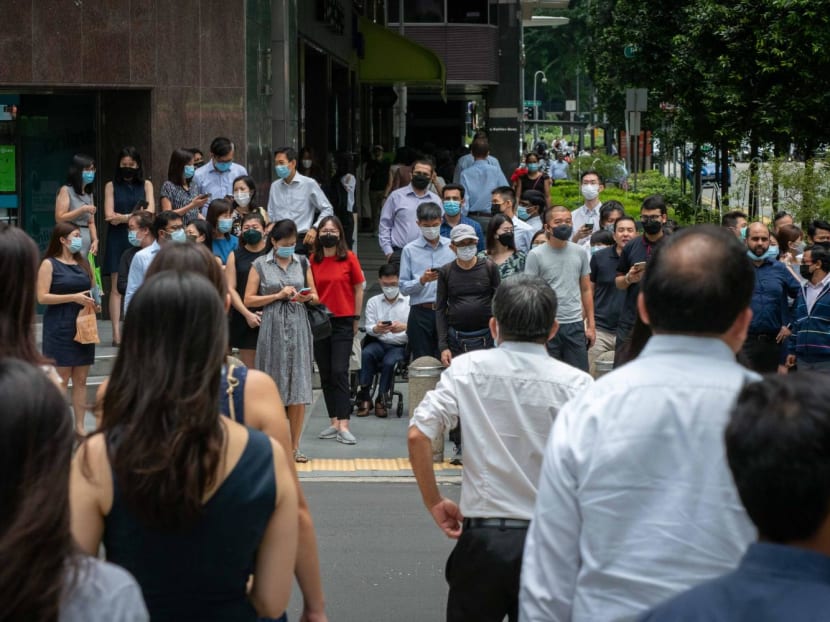Singapore maintains 2023 GDP forecast at 0.5% to 2.5%, after economy grew 3.6% last year
SINGAPORE — Singapore has maintained its growth forecast for 2023 at a range of 0.5 per cent to 2.5 per cent, as data on Monday (Feb 13) showed the economy growing slower than expected last year.
SINGAPORE — Singapore has maintained its growth forecast for 2023 at a range of 0.5 per cent to 2.5 per cent, as data on Monday (Feb 13) showed the economy growing slower than expected last year.
The economy expanded by 3.6 per cent in 2022, slightly below earlier government estimates of 3.8 per cent. Growth was mainly driven by the wholesale trade, manufacturing and other services sectors, said the Ministry of Trade and Industry (MTI).
For the final quarter of last year, the economy grew by 2.1 per cent year-on-year, just below the previous projection of 2.2 per cent and moderating from the 4 per cent expansion in the third quarter.
On a quarter-on-quarter seasonally-adjusted basis, the economy expanded marginally by 0.1 per cent, also missing an earlier forecast of 0.2 per cent and easing from the 0.8 per cent growth in the previous quarter.
The latest growth report card also showed an upward revision in the gross domestic product (GDP) figure for 2021 – from 7.6 per cent to 8.9 per cent.
This was done “to account for data updates and revisions from various sources, including the annual sectoral surveys that (the ministry) carried out throughout 2022”, said MTI’s permanent secretary Gabriel Lim at a press conference.
OUTLOOK 'IMRPOVED SLIGHTLY'
While it has kept to its earlier forecasts for growth, MTI said Singapore’s external demand outlook for 2023 has “improved slightly” since its last quarterly report in November.
In particular, growth in China is set to pick up with the easing of the country’s strict pandemic rules.
“China’s faster-than-expected reopening from the Covid-19 restrictions will definitely not just help but benefit Singapore’s sectors – for example, tourism, aerospace and so on – but also uplift regional economies, which will in turn also have a positive second-order effect on Singapore,” Mr Lim said.
However, this ought to be seen in the context of broader challenges elsewhere, such as in the United States and the eurozone, he added.
The growth outlook for these Western economies remains weak because of tight financial conditions, which will weigh on consumption and investment spending.
MTI also cautioned of uncertainties that remain in the global economy.
These include the impact of tighter financial conditions on global growth, as well as the risk of further escalations in the ongoing Ukraine war and geopolitical tensions among major global powers.
Against this backdrop, the local economy will likely see an uneven growth outlook ahead.
The recovery in international air travel and inbound tourism, boosted by the relaxation of China’s border restrictions, is set to bump up growth in sectors such as air transport, accommodation and arts, as well as entertainment and recreation.
The output of the aerospace segment is also expected to be bolstered by the improved outlook for air travel.
On the other hand, the growth outlook for other outward-oriented sectors remains weak amid a broader slowdown in the global economy.
For instance, the semiconductors segment of the electronics cluster will likely be negatively affected by weaker global semiconductor demand, while the precision engineering cluster is projected to be weighed down by a cutback in capital spending by semiconductor manufacturers.
The slowdown in major external economies will also weigh down on growth in the wholesale trade, water transport and finance and insurance sectors.
“Taking into account the global and domestic economic environment, the GDP growth forecast for 2023 is maintained at 0.5 to 2.5 per cent,” MTI said.
MONETARY POLICY STANCE IS 'APPROPRIATE': MAS
Also speaking at the press conference, Mr Edward Robinson, deputy managing director of the Monetary Authority of Singapore (MAS), who said the central bank’s current monetary policy stance is “appropriate”.
Last October, the MAS re-centred the mid-point of its Singapore dollar nominal effective exchange rate policy band “up to its prevailing level”, tightening monetary policy for the fifth time since October 2021.
The cumulative effects of these tightening moves will help to slow inflation momentum and ensure that “price pressures do not become entrenched in the economy”, said Mr Robinson, adding that “recent out-turns in inflation and growth have come somewhat closer in line” with MAS’ expectations.
The central bank’s next half-yearly policy review remains scheduled for April. CNA
For more reports like this, visit cna.asia.










